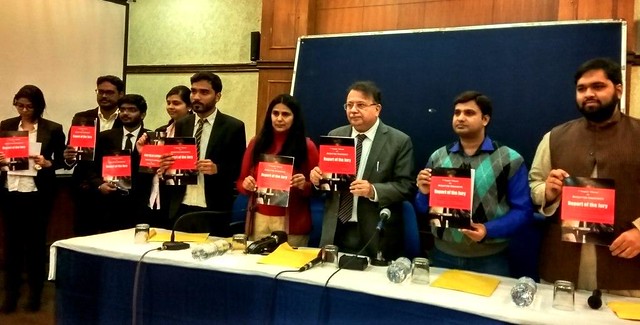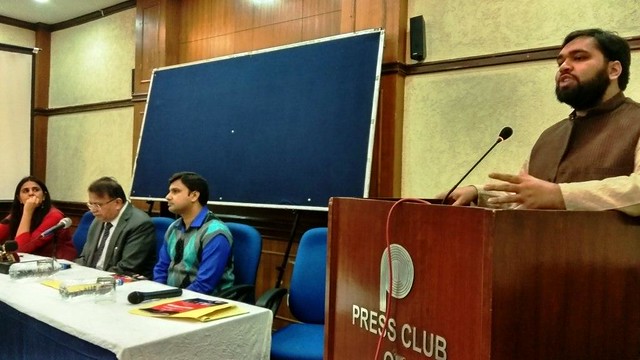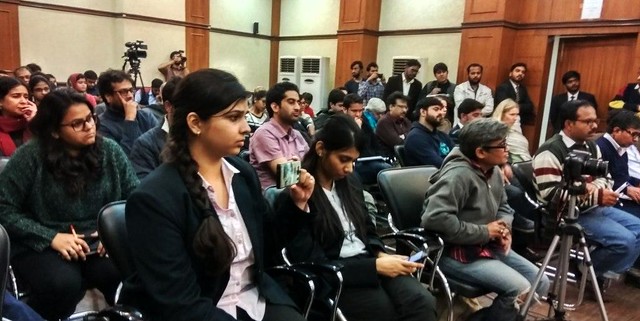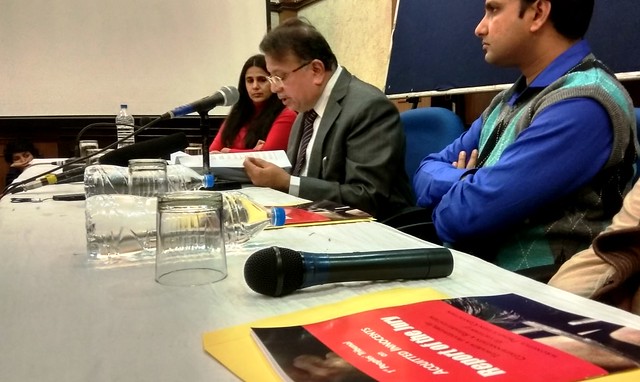By Twocircles.net Staff Reporter
Media must refrain from pronouncing terror accused as ‘guilty’ till a formal pronouncement is made by the court, and a rights-based approach should be adopted by the State to grant compensation to the victims of wrongful actions of the State, a Jury led by Justice AP Shah, former Chairman of Law Commission of India said at a press conference in Delhi on December 10.
Justice Shah was speaking at the release of the Jury report based on the People’s Tribunal on Acquitted Innocents in terrorism cases, which was conducted in October.

Apart from Justice A.P Shah (Ex CJI Delhi High Court, Chairman of the 20th Law Commision of India), other members of the jury included noted filmmaker Saeed Akhtar Mirza, G.S. Bajpai (NLU Delhi Registrar), noted journalist Neena Vyas, Delhi School academic Nandini Sundar, TISS Deputy Director Abdul Shaban, journalist Vinod Sharma and Advocate Monica Sakrani.
“The amount of compensation must be decided on a case to case basis taking into account both pecuniary and nonpecuniary losses,” the jury said in its report.
On October 2, 2016, Innocence Network India had organised the first People’s Tribunal on Acquitted Innocents in terrorism cases, which saw 15 innocents from across the country depose in front of the jury.

“The depositions (on October 2) explicitly make clear all that is wrong with the criminal justice system when it comes to dealing with cases of terrorism. The Jury, while recognizing the need for the State to provide compensation to the victims for their wrongful conviction, identified different stakeholders involved in the entire process of arrest and acquittal,” the report said.
“The wrongful prosecution did not result from mere technical errors or genuine human lapses in investigation, but from willful and malicious investigation and prosecution. It does appear that it is routine for police and investigating agencies to round up and arrest Muslim youth in the aftermath of any bomb explosion or aĴack. The most striking example of this is the manner in which investigation into the Malegaon blast 2006 was carried out. Members of the Muslim community were rounded up, trumped as SIMI activists and shown as key suspects despite the fact that at least one of them was already in police custody at that time, and another key accused was hundreds of kilometres away leading the shab-e-baraat prayers in Yavatmal on that very day,” the report of the Jury says.
“The testimonies laid bare the excessive powers granted to the investigating agency under the anti-terror legal regime. The Jury is constrained to note that these laws have a decided lawless character, and have resulted in the false implication of scores of youth on charges of terrorism,” it added.

Suggestions
Compensation: A rights based approach should be adopted by the State to grant compensation to the victims of wrongful actions of the State. The amount of compensation must be decided on a case to case basis taking into account both pecuniary and non pecuniary losses.
Accountability: The police officials involved in such cases must be held accountable. A departmental inquiry must be conducted against them. Further, these police officials should be made criminally liable for the malicious acts done by them in their official capacity.
Guidelines for media: The media ought to be cognizant of its power to devastate lives through sensationalism and partisan reporting. The media must refrain from pronouncing the accused as guilty till a formal pronouncement is made by the court. Further, the media must publish an apology, if it had written defamatory material against the acquitted innocent at the time of his arrest.
Legislative reforms: Article 14(6) of the ICCPR must be incorporated into legislative framework. The Prevention of Torture Bill should be passed by the Parliament. Provisions of the anti-terror laws, Indian Evidence Act and Criminal Procedure Code should be amended to hold erring officers accountable and to curb custodial violence.
Institutional And Societal reforms: Human Rights bodies such as NHRC and SHRCs must establish a dedicated cell to look into the cases of acquitted persons. The public must also make an active attempt towards rehabilitation of such acquitted persons.

Failure of Human Rights bodies
The Jury expressed dismay at the failure of the Human Rights bodies such as the National Human Rights Commission and various State Human Rights Commissions to acknowledge the issue and intervene in such cases of wrongful arrests and prosecution.
The report is a first of its kind document in India that points out how providing adequate reparations is a duty of the state and falls explicitly within its justice framework. It, then, lays down the jurisprudence of compensation and issues clear guidelines for a comprehensive legislation for compensation and rehabilitation for those who have been wrongfully prosecuted/convicted. Other speakers at the event included Manisha Sethi of Jamia Teachers’ Solidarity Association and Wasif Haider, who was falsely accused in a terrorism case by the UP police and was one of the Innocents who had deposed before a panel.
The Jury also took strong note of the torture culture in India, and said, “One of the key features of all testimonies was the systematic torture that the suspects were subjected to by the agencies. As many existing reports have shown, torture is endemic to India’s policing culture. In terror investigations, however, it seems to be the very cornerstone.”

